- Home
- Mark Timlin
The Turnaround Page 3
The Turnaround Read online
Page 3
I put the photos back in their envelope and tasted old beer, sharp and acid in my throat.
‘Keep and enjoy,’ said Robber. ‘You didn’t get them from me. Now get out of here.’
I stood up. ‘Have a nice evening,’ I said.
‘Come round any old time. I’m always here.’ And he laughed, showing dirty teeth with a piece of pie crust lodged between a molar and the next tooth.
‘I’ll remember that,’ I said. I went back into the music bar where a bad imitation of Bad Company were doing Can’t Get Enough.
I’m afraid I couldn’t agree. I’d had more than enough for one evening. I went back to the Jag and drove home and my ears were ringing all the way.
I put the envelope in a drawer and made a decent drink of vodka and chocolate milk and smoked five cigarettes, one after another, and wondered what the hell I was getting into. A thousand pounds. Five days and finish.
I went to bed and lay there thinking about what Robber had said about James Webb. Dirty… or was he?
Surely not. If he was, why hire me at this late date? It didn’t make sense. But what did? And with that thought, I fell asleep and dreamt of blood.
4
The next morning I made my first visit to the murder scene in Crown Point. I got up early and gave Cat his breakfast and made myself a bacon sandwich on whole-wheat toast and a cup of coffee. Cat and I didn’t speak as we ate. I like that in breakfast companions. Some I’ve had never stop. I smoked a cigarette and listened to the news on the radio, let the cat out and set off.
It wasn’t a long drive, barely fifteen minutes. But the part of Crown Point I wanted was one of those inner suburbs that has pretensions to being a village within a city. It probably hadn’t changed much from when it was almost a village. And no one had bothered to put up any street signs. I had to double back and forth down avenues with no kerbs or pavements, lined with high walls or hedges, before I found the close I was looking for. There wasn’t a living thing to be seen. It was like someone had come along and doped all the inhabitants. Not even a bird sang. I felt like the last person alive on the planet. Now that would be just my luck.
It was cloudy and cool when I stopped the car outside one of a pair of imposing iron gates set in the high walls around the house. They were closed tight and secured with a thick chain and padlock. I climbed out of the car and took the bunch of keys that James Webb had given to me out of my jacket pocket.
It was a Chubb lock, top of the range, and I found the appropriate key on the ring and tried it. It worked smoothly. I pulled the chain through and looped it over a curlicue of black iron and pushed one half of the gate open. It creaked as it parted from its mate. A real Hammer House of Horror job. I closed the gate behind me and crunched across the gravel drive towards the house. Grass was growing through the stones and the front garden was untidy and neglected. It was very quiet behind the garden walls with only the buzz of a plane beginning its run into Gatwick to break the silence.
Close to the house the lawn and the drive were churned with ancient tyre tracks and I imagined what it must have looked like on the night of the murders. First to arrive would have been crime cars and ambulances, headlights on full beam to illuminate the front of the house and blue lights flashing lazily at synchronised beats per second. Figures would have cast long, narrow shadows and their faces, pale under uniform caps, would have been lit harshly in the bright light. The air would have been full of the splintered crackle of the static-punctuated voices on the radios. Next would have come the anonymous Cavaliers and Sierras of the CID, parked outside to save any tyre tracks the first cars on the scene hadn’t obliterated. Then more plain saloons would have arrived: SOCO, forensic and fingerprint teams. At first light, vans full of uniformed men for the fingertip search of the grounds and the mini-vans of the dog-handlers. Finally a mobile HQ would have been towed in and parked slap bang in the middle of the drive and a canteen would have set up outside the gates. TV crews would have filmed the lads eating bacon sarnies and drinking cups of tea for want of something better to do. That night and the next day would have been the busiest, the area taped off and all sorts of coppers wandering about trying to look important. And then…
Well then, as the days and weeks went past, and the murders went cold, and more recent atrocities vied for the public’s and media attention, one by one the cars and vans and the canteen would have vanished, and finally the HQ would have been towed off again, and the gates locked, and the investigation team run down, and finally disbanded altogether.
And now there was just me. God help us all.
The house itself looked like it was asleep. Dark and melancholy under the low cloud, with its windows closed against curious eyes. I climbed the stone steps to the porch. The front door was fully ten feet high and six feet wide, made of old timbers bound by iron. I took the piece of paper Webb had given me with the combination to the alarm on and unlocked the door, using two more of the keys on the ring. It opened like the jaws of a trap.
I heard a buzzer start, just like he’d said it would, and pushed the door all the way and looked on the wall to my right. There was a key pad at chest height and I punched in the digits Webb had written down. The buzzer stopped. Very efficient. I stood on the threshold and smoked a cigarette before I went any further. Eventually I walked into the hall, leaving the door open behind me. I sniffed and thought I smelt old gunpowder and blood and death. I wrinkled my nose in disgust.
I hit all six light switches mounted above the alarm pad. A central fixture and wall-mounted lamps sprang to life and the interior of the hall came into chilly view. I shivered. I’d been inside houses where sudden death had struck lots of times in my life, but for some reason this was the closest to death I’d ever felt. I walked across the hall to the furthest door and opened it. The room was dark but it felt big. I ran my hand down the wall inside the door, found another light switch and pushed it down. For one split second as the light came on I thought I saw ghostly figures and faces turn towards me but the room was empty. Inside the room I saw the first signs of violence. The big, pale pink leather sofa was stained brown and there were huge tears in the fabric as if a giant had taken a bite out of the material. The cushions were shredded and the filling that had burst out from the covers was stained brown too. It was the room in the first of the photographs. I looked away from the wounded sofa and up at the walls. A long smear of brown marred the wallpaper and, when I looked closely, I saw dozens of small holes from a round of buckshot. Some had been enlarged where the forensic team had dug out the shot for analysis.
Pink velvet curtains covered one wall floor to ceiling, and I found the pulley and opened them. Half of the patio window had been removed and plywood filled the gap. I looked through the other at the unkempt back garden that stretched away for two or three hundred yards. It had started raining, and the sight of it made me feel colder. I looked around again and saw fingerprint powder remains on every surface. On top of the fingerprint powder was over a year’s accumulation of dust. The daylight, dim as it was, showed up the stains on the carpet. On the night of the murders, it must have been a regular blood swamp. The place didn’t look as if it had been turned over. Webb had made a good job of putting it back together again.
I left the room and went upstairs. The master bedroom faced the top of the stairs. I went in. It was neat and the bed was made. Apart from the dust on the surfaces it looked ready for use. I walked out again. Along the corridor was another set of stains and more holes in the wall, but lower down this time. I was standing where the elder of the boys had been shot. He’d only been about four feet tall after all. I was beginning to realise that there were really sick people involved in this case. Sick or desperate, or both.
I went into the first of two smaller bedrooms. It was empty. I left it and went next door into another small bedroom. Of all the rooms in the house, it smelled most strongly of death. It was where the younger boy had died. In the centre of the room was a bare mattress and base. The matt
ress was ripped apart and stained with old blood and body fluids. I don’t know what possessed Webb to keep it. A reminder, I suppose, to keep the anger fresh. No wonder his wife wouldn’t come to the house or an estate agent to show people round.
The walls of the room were covered with fading posters of sports and pop stars. Bros and Kylie were splattered with body fragments. A long sliver of dead tissue hung down from a team picture of Chelsea FC. I was surprised forensic had missed it. Maybe they had more than enough by then, and left a little for me. I touched it, and it crumbled and fell to the floor. I rubbed my finger tips together to get rid of the remains of the mummified flesh and my mouth filled with sour saliva which I swallowed with a grimace.
I knew there was no point in searching the place. Hundreds of pairs of hands and eyes must have been through everything. I hardly expected that I would turn up anything new. I went back downstairs and left the house, resetting the alarm and locking the front door behind me. I walked back down the drive and through the gates and fastened the chain with the padlock again. I sat in the car and listened to a phone-in on organic farming in the Home Counties and smoked another cigarette to get the taste of the place out of my mouth. After ten minutes or so I started the car and went to get a drink. On the way out of the close I passed a dark blue Mini coming in.
5
As I sat in a miserable pub on the south side of Crown Point, near Croydon, I realised that I’d have to go back and knock on some doors around the Kellerman house. Maybe someone had seen something they hadn’t told the police.
But I wasn’t going back again that day. The combination of the rain, the photos I’d seen the previous night and my visit to Oakfield that morning, had dulled my enthusiasm for the job. Not that there’d been that much to start with. I was beginning to wish I’d stayed in my office watching TV. I decided to drive home, make a couple of calls, leave the car and walk to my favourite bar and seek some like-minded company. More unemployable people who had nothing to do all day. Then after a few beers I was going to go home again, shower, change, and take my main squeeze out to dinner. Not that she was quite as main or as squeezable as she had been, but that’s life.
As soon as I got in, I called Webb. ‘Sharman,’ I said when he answered.
‘Have you found anything?’ he asked. His voice was full of hope.
‘No,’ I replied. ‘But I’ve been to the house.’
‘And?’
‘Nothing,’ I said. ‘But why haven’t you cleared it out?’
‘I don’t want to.’
‘Any particular reason?’
‘You wouldn’t understand.’
‘Try me.’
‘I’m not going to touch it again until I know who killed them. If I ever start to forget, I can go back and look around again. Do you understand that?’
Jesus Christ, I thought. ‘I understand, Jim,’ I said. It was the first time I’d called him that because I wanted to. ‘Better than you’ll ever know.’ I didn’t explain. It would have taken a lifetime. ‘Listen, I’ll get back to you. Call me if you need anything. You’ve got my number?’
‘Yes.’
‘OK. I’ll see you.’
I got to the bar around two. There were a few faces in there that I knew. I drank three bottles of Rock and discussed the state of the world and daytime TV. The world came off worst. After I’d finished my third drink I left.
Fiona arrived at seven. One thing I will say is that she’s punctual. She used her own key to let herself in. She was dressed in a long, dark blue coat over a lilac mini-dress in some material that stretched where she was convex and shrank where she was concave. It was an edifying sight.
‘Hello, Nick,’ she said as she came in.
‘Hello yourself. How are you?’
‘Just dandy. What’s the plan?’
‘Dinner at Lena’s. My treat. Dawdle over coffee and liqueurs and back here. How does that grab you?’
‘Fine,’ she said and came over and kissed me briefly. ‘Who’s driving?’
‘Cabbies. I’ve called a taxi. Ten minutes.’
It was nearer half an hour before the cabbie arrived and from the state of the motor it was a miracle he’d got there at all. He was driving a Morris Marina automatic that wouldn’t kick itself out of low drive. The car was showing more smoke than the QE2. The radio was stuck on Capital Gold, and the back seat cushion wasn’t attached to any other part of the car. Every time the Marina got up enough speed to warrant using the brakes, the bloody seat tipped forward and nearly left us on the carpet. Once Fiona and I would have had hysterics and held tightly to each other, choking with laughter, and the whole thing would have made our evening. Now it just made us both irritable.
When we got to Lavender Hill the driver asked for a fiver. I gave him three quid and dared him with a look to take it further. He left it.
We went inside the restaurant and got our favourite table in the corner by the window. I had a Singha beer to calm me down and Fiona had a gin. We started on the prawn crackers and things started to warm up a bit.
‘I can sit on my hair,’ she said after she’d sunk three-quarters of her large gin and tonic in one gulp. Her hair had got very long and hung over her shoulders and down her back as black and shiny as newly mined coal.
‘You nearly sat on it in the back of that bloody cab,’ I said.
‘I know. Your face! It was a picture.’
‘You kept showing your knickers to the driver,’ I said. ‘I wouldn’t mind but I had to pay him and he got a show.’
‘You’re lucky I’ve got any on. Every time the seat tilted my skirt got caught up and I didn’t. It wasn’t my fault.’
I had to laugh and she joined in. ‘Oh, Nick,’ she said. ‘You do try and stay dignified.’
‘So?’
‘And you just end up looking like your shoes hurt.’
‘OK,’ I said after a minute. ‘You’re right. Sorry, it’s been a bad day.’
‘Why?’
‘I’m working on a new case.’
‘What?’
I told her a bit. Not everything. I’ve found that murder and Thai food don’t go. It can ruin the soft noodles if you’re not careful. So, like I said, I told her a bit.
When I’d finished she said, ‘Can’t you get a proper job?’
I’d obviously told her too much.
‘You knew what I was.’
‘I know, but…’
‘But you thought I’d change.’ I finished her sentence for her. She pulled a face. We’d had similar conversations before.
‘Let’s not go into it again,’ I said.
‘OK, Nick.’
So somewhat subdued, but at least still friends, we ordered our food. By the time we’d eaten chicken satay, sweetcorn and crab meat in tiny savoury baskets, prawns in a black pepper sauce, stir-fried vegetables and a portion of special noodles with mixed meats; and drunk between us a bottle of wine, two gins, three beers, four of the best cappuccinos in London, and five liqueurs, we were less subdued and I got the waiter to order us a cab back to mine. I checked, just in case, but the restaurant didn’t use the firm with the cab with the mobile back seat.
We got back about eleven. I turned the lights down low and put a Sam Cooke album on the stereo. Corny, but I did it anyway. Trouble is it’s hard to be subtle in a studio flat when the largest item of furniture in the room is the bed. Not that Fiona and I were exactly strangers to it. But, you know, sometimes it’s good not to be too predictable.
‘Seduction, Sharman?’ she asked. I needn’t have bothered. She reads me like a book, see.
‘Have a drink and shut up,’ I said.
‘You’ll have me pissed.’
‘Good.’
‘I expect you’ve got some weed to get me horny too.’
‘If you want,’ I said. ‘Someone gave me a few joints.’
‘And if they gave out airline tickets down on the farm, pigs could fly.’
She got up to get a joint out of the drawer wh
ere I generally keep such things. ‘What are these?’ She held up the envelope full of the SOC photos at the Kellerman house that Robber had given to me.
‘Don’t,’ I said.
She opened the flap and pulled out the photos. ‘Jesus Christ,’ she said as she riffled through them.
‘I didn’t want you to see those.’
‘Nick, is this what you’re involved in?’
I didn’t answer. I didn’t have to.
‘Keep your drink, and your dope,’ she said. ‘I’m going.’
‘Fiona –’
‘No. Call me when you’re out of it.’ And she put on her coat and left. She was over the limit to drive but I didn’t think that it was the right time to mention it.
I found one of the joints and lit up. I took Sam Cooke off the turntable and put on Herbie Hancock instead. With the volume very low. I kicked off my shoes and sat in front of the dead TV set and thought about Fiona and me. Me and Fiona. We’d been together for a while. Well, six or seven months anyway. Something of a record.
Then she’d got too involved in a case I was working on that ended in a spectacularly messy way. After it was all over she decided that I should settle down and get a ‘proper job’, as she called it. I refused and the relationship had started to splinter. The problem was that I knew she still loved me, and I loved her too. As much as I know how. Maybe that was the trouble. She recognised my lack of commitment and resented it. And who could blame her? Christ knows, I wanted to be committed to someone. But somehow it never seemed to happen. There’s something lacking in me, see. Ask anyone. Especially my wife and the girlfriends I had before and since, and even at the same time.

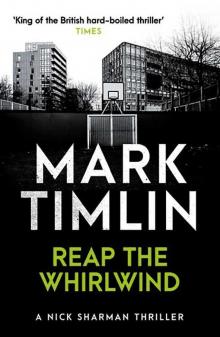 Reap the Whirlwind
Reap the Whirlwind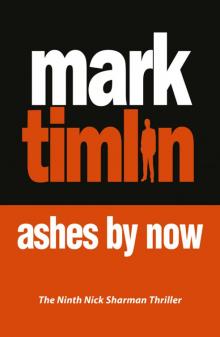 Ashes by Now
Ashes by Now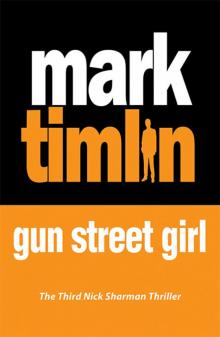 Gun Street Girl
Gun Street Girl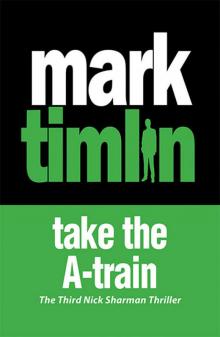 Take the A-Train
Take the A-Train Pretend We're Dead
Pretend We're Dead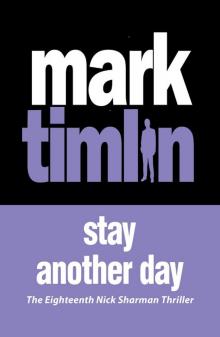 Stay Another Day
Stay Another Day Paint It Black
Paint It Black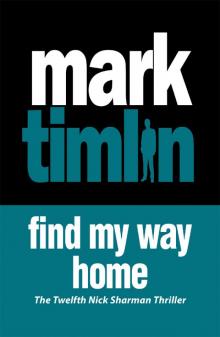 Find My Way Home
Find My Way Home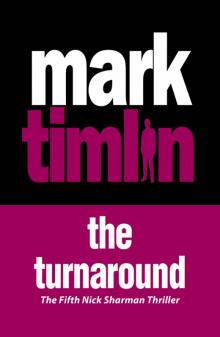 The Turnaround
The Turnaround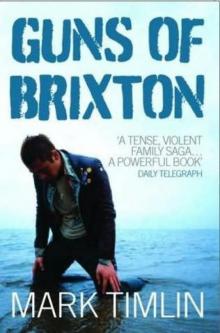 Guns Of Brixton
Guns Of Brixton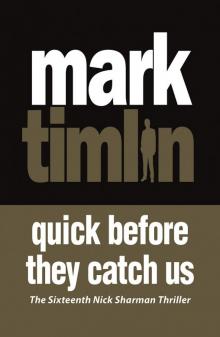 Quick Before They Catch Us
Quick Before They Catch Us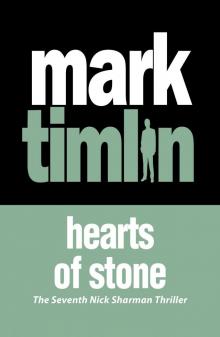 Hearts of Stone
Hearts of Stone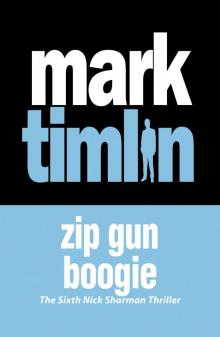 Zip Gun Boogie
Zip Gun Boogie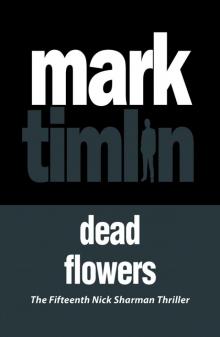 Dead Flowers
Dead Flowers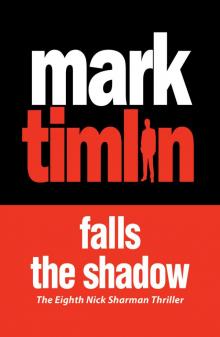 Falls the Shadow
Falls the Shadow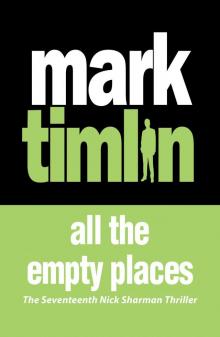 All the Empty Places
All the Empty Places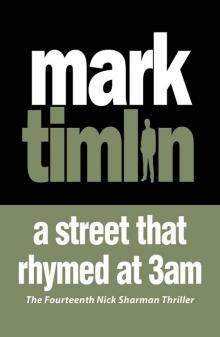 Street that Rhymed at 3am
Street that Rhymed at 3am